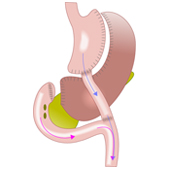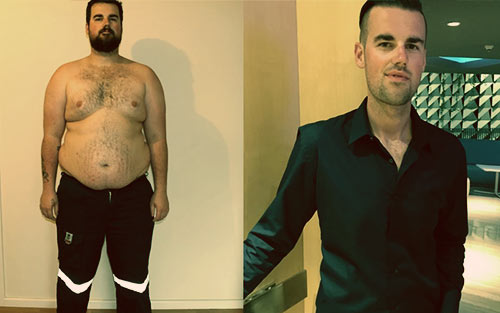Gastric bypass
Gastric bypass, aims to reduce the size of the stomach, in addition to enabling food to pass through part of the small intestine. By this way, you will feel full in a shorter time than you needed with your original size stomach, which leads to reducing the amount of food you eat, and also limiting the number of calories you consume.

Bypassing a part of the intestine by gastric bypass causes it to absorb fewer calories, which leads to weight loss.
Why do Gastric bypass?
Although the considerations of whether to undergo surgery or not is different from one medical institution to another, gastric bypass surgery becomes possible when the BMI 40 or more! Or when the overweight becomes a risk factor for a person’s life, or when it’s limiting his capabilities.
Doctors may study the possibility of gastric bypass surgery in cases of a person hasn’t succeeded in losing weight with other treatment methods.
The good candidate for gastric bypass surgery has to have:
- Overweight condition.
- No drinking disturbances.
- No Depression.
- Between 18 and 65 years old.
Of course, gastric bypass surgery has some risks! Therefore it is important that you discuss the various treatment options with your doctor, and you choose the best treatment for you.
Gastric Bypass surgery process:
The most common stomach bypass surgery is (ROUX – EN – Y).
During the normal digestive process, food passes through the stomach, then steps inside the Small Intestine, where the majority of nutrients and calories are absorbed. After that, food moves to the colon, and eventually the feces passed out in the form of stools.
In (ROUX – EN – Y) gastric bypass type, the stomach is reduced by creating a small pocket at the upper end of the stomach, using surgical presses or plastic bands.
After that, the minimized stomach is connected directly to the central section of the small intestine.
Gastric bypass operation can be performed by making a large incision in the abdomen, or by performing small incision using small tools with camera to lead the surgery (laparoscopy).
After the Surgery,
Most people will be able to return to their normal lives within 3-5 weeks after surgery.
Gastric bypass can cause Dumping Syndrome, it occurs when food moves too fast through the stomach and intestines which causing, nausea, hyperhidrosis, near syncope, and possibility of diarrhea after eating. These symptoms are exacerbated after consuming processed foods which are full of calories just like sweets.
In some cases, it is possible to have weakness, which requires to lie down until the symptoms are stabilized.
Gastric bypass cost in Turkey
Please contact us to get quta for your case





